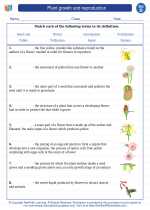Ecosystems
An ecosystem is a community of living organisms in conjunction with the nonliving components of their environment, interacting as a system. These components include biotic factors such as plants, animals, and microorganisms, as well as abiotic factors such as air, water, soil, and sunlight.
Components of an Ecosystem
- Producers: Organisms that produce their own food through photosynthesis, such as plants.
- Consumers: Organisms that obtain energy by consuming other organisms, such as herbivores, carnivores, and omnivores.
- Decomposers: Organisms that break down dead organic matter, releasing nutrients back into the ecosystem, such as bacteria and fungi.
- Abiotic Factors: Non-living components of the ecosystem, including sunlight, water, air, temperature, and soil.
Types of Ecosystems
Ecosystems can be classified into various types based on their characteristics:
- Terrestrial Ecosystems: Ecosystems found on land, such as forests, grasslands, deserts, and tundra.
- Aquatic Ecosystems: Ecosystems found in water, such as oceans, lakes, rivers, and wetlands.
- Artificial Ecosystems: Ecosystems created or influenced by human activities, such as agricultural fields, urban areas, and gardens.
Interactions in Ecosystems
Ecosystems are dynamic and are characterized by various interactions among organisms and their environment:
- Food Chains and Webs: The transfer of energy and nutrients through a series of organisms in an ecosystem.
- Symbiotic Relationships: Mutualistic, commensal, and parasitic interactions between different species in an ecosystem.
- Succession: The process of change in the species structure of an ecological community over time.
Human Impact on Ecosystems
Human activities have a significant impact on ecosystems, leading to issues such as habitat destruction, pollution, overexploitation of resources, and climate change. Understanding these impacts is critical for conservation and sustainable management of ecosystems.
Study Guide
To study ecosystems effectively, consider the following key points:
- Identify and understand the components of an ecosystem, including producers, consumers, decomposers, and abiotic factors.
- Explore the different types of ecosystems and their unique characteristics.
- Examine the interactions and relationships within ecosystems, such as food chains, symbiotic relationships, and ecological succession.
- Discuss the impact of human activities on ecosystems and the importance of conservation efforts.
- Engage in hands-on activities, such as field trips, experiments, and observations, to gain practical insights into ecosystems.
By comprehensively studying ecosystems, you can develop a deeper understanding of the intricate relationships between living organisms and their environment, and appreciate the importance of preserving and protecting these complex systems.
[Ecosystems] Related Worksheets and Study Guides:
.◂Science Worksheets and Study Guides Fourth Grade. Plant growth and reproduction
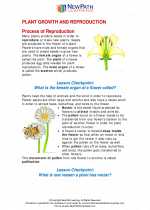
 Worksheet/Answer key
Worksheet/Answer key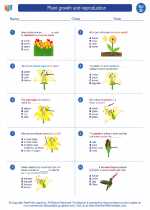
 Worksheet/Answer key
Worksheet/Answer key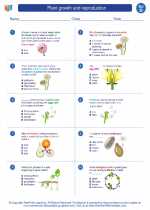
 Worksheet/Answer key
Worksheet/Answer key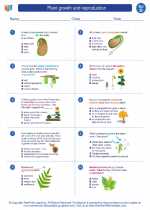
 Vocabulary/Answer key
Vocabulary/Answer key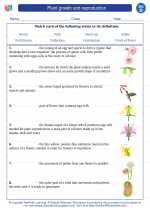
 Vocabulary/Answer key
Vocabulary/Answer key